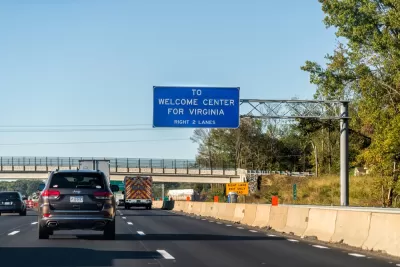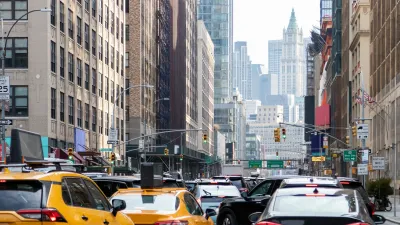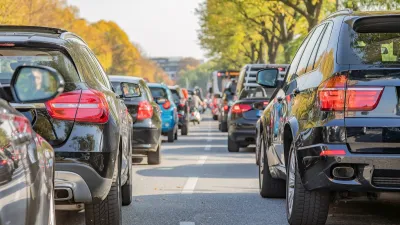Experts say reducing speed limits based on traffic volumes can relieve congestion and improve the flow of traffic.

“Hoping to decrease driving delays, last month the Virginia Department of Transportation introduced variable speed limits between mile markers 115 and 130 south of Fredericksburg,” reports Wyatt Gordon in the Virginia Mercury. “Currently, 20 states deploy variable speed limits on at least one stretch of their road networks,” where research shows an average of 5 percent reduction in travel times and 8 percent fewer crashes. “Spaced six-tenths of a mile from one another and at each of the three highway on-ramps along the corridor, the 48 signs each have congestion detectors designed to predict potential traffic problems and drop the speed limit by up to 10 mph per minute.”
The problem variable speed limits seek to solve is called speed flow inversion — the phenomenon whereby even minor interruptions in vehicles’ movement cause extensive congestion due to the density of traffic.
According to Eric Dumbaugh, associate director of the Collaborative Sciences Center for Road Safety at Florida Atlantic University, “This type of technology only works if you have total compliance and a majority, if not all, road users see the sign and adhere to that speed.” The agency is using billboards, signs, and alerts on Waze to alert drivers to the variable speed limits. “The first indications of whether VDOT’s $10 million investment in the new corridor is paying off should come in September, when the agency completes its first round of data on crash rates and types, the frequency of speed reduction, compliance and person-hours of delay.”
FULL STORY: VDOT is introducing variable speed limits, but will congestion care?

Alabama: Trump Terminates Settlements for Black Communities Harmed By Raw Sewage
Trump deemed the landmark civil rights agreement “illegal DEI and environmental justice policy.”

Planetizen Federal Action Tracker
A weekly monitor of how Trump’s orders and actions are impacting planners and planning in America.

The 120 Year Old Tiny Home Villages That Sheltered San Francisco’s Earthquake Refugees
More than a century ago, San Francisco mobilized to house thousands of residents displaced by the 1906 earthquake. Could their strategy offer a model for the present?

In Both Crashes and Crime, Public Transportation is Far Safer than Driving
Contrary to popular assumptions, public transportation has far lower crash and crime rates than automobile travel. For safer communities, improve and encourage transit travel.

Report: Zoning Reforms Should Complement Nashville’s Ambitious Transit Plan
Without reform, restrictive zoning codes will limit the impact of the city’s planned transit expansion and could exclude some of the residents who depend on transit the most.

Judge Orders Release of Frozen IRA, IIJA Funding
The decision is a victory for environmental groups who charged that freezing funds for critical infrastructure and disaster response programs caused “real and irreparable harm” to communities.
Urban Design for Planners 1: Software Tools
This six-course series explores essential urban design concepts using open source software and equips planners with the tools they need to participate fully in the urban design process.
Planning for Universal Design
Learn the tools for implementing Universal Design in planning regulations.
Clanton & Associates, Inc.
Jessamine County Fiscal Court
Institute for Housing and Urban Development Studies (IHS)
City of Grandview
Harvard GSD Executive Education
Toledo-Lucas County Plan Commissions
Salt Lake City
NYU Wagner Graduate School of Public Service





























